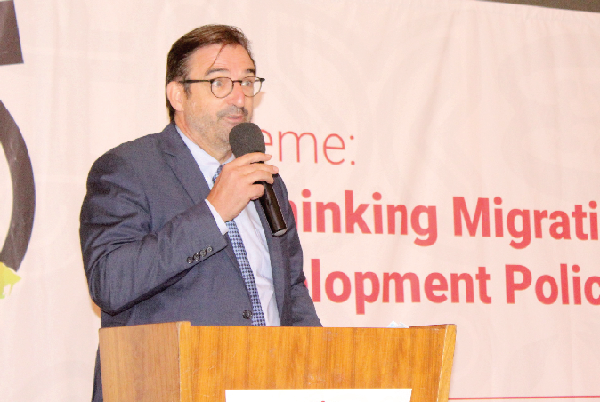Do not migrate through the Sahara, the Mediterranean Sea — German Ambassador
Daniel Krull (inset), German Ambassador, addressing conference participants. Photo: ERNEST KODZI
German Ambassador to Ghana Daniel Krull advised Ghanaians that the best way to legally migrate to Germany is through education and training.
He therefore called on Ghanaians to convince their compatriots not to choose the fatal path of illegal migration through the Sahara and the Mediterranean Sea.
“We have to convince them not to spend their money on facilitators who help them cross this fatal road. Education can pave the way for legal migration,” he said.
Mr Krull said so in Accra last Tuesday at a conference on gender and migration organized by the Ghanaian-German Center for Employment, Migration and Reintegration (GGC), with the support of Deutsche Gesellschaft für Internationale Zusammenarbeit (GIZ), and in collaboration with the Ministry of Employment and Labor Relations and the Ministry of Gender, Children and Social Protection.
About the conference
Knowing the critical role that gender plays in the discourse and management of migration, GGC mainstreamed gender in all its activities and the conference, held annually since 2019, had brought together stakeholders, civil society organizations and professionals to deliberate on the role of gender in migration.
This year’s conference is themed: “Rethinking Feminist Migration and Development Policies: Insights from Ghana”.
Mr Krull said the narrative that migration was a threat to Germany was changing dramatically because Germany needed people to come and work to contribute to its wealth and economy.
Citing German media reports, he said Germany would need about 500,000 new members of society to share in its future development growth.
He spoke about the efforts made by different parties in the German government to adjust migration laws in the country.
Addressing the theme of the conference, the German Ambassador said that migration policies are only successful if they are gender sensitive, adding that a person’s sex, gender, identity and sexual orientation shape each stage of the migratory experience, in particular the choice of destination. , the degree of vulnerability and their inclination of family, friends and society to accept their return.
He said the current refugee crisis caused by Russia’s war on Ukraine was a stark example of how gender played a role in the migration crisis, pointing out that at any given time, 19% of migrants Ukrainians were women and children.
“We have to stop this war. We have to stop Putin. Russia must end this war,” he said.
Rethink migration
Deputy Minister of Employment and Labor Relations, Bright Wireko-Brobbey, said it was appropriate to rethink migration, given that migration has intensified and diversified over the past decades and accelerated in recent times due to major conflicts and regional political and economic changes. .
Citing UN Women, he said women migrated for a variety of reasons, including poverty, conflict, gender-based violence and harassment, pointing out that many female migrant workers were often confined to low-skilled jobs in the areas of domestic and domestic work. care, hotel and reception services.
Commissioner for Refugee Policy, Director of Displacement and Migration at the German Ministry for Economic Cooperation and Development, Dr Elke Löbel, said feminist development policy was a political movement that involved everyone, including including men, women, boys and girls.
For her part, the Director of the Center for Migration Studies at the University of Ghana, Professor Mary Boatemaa Setrana, said there has been an increase in the proportion of female migrants from Africa.


Comments are closed.